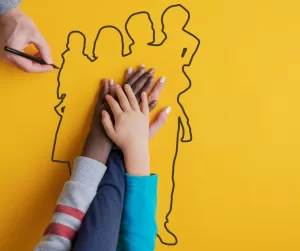
When parents direct their kids and tell them what they should do to improve themselves, it lands on the child as I’m not okay the way I am, instead of empathy in action.
Q. “How can I help my 8 year old son understand that I love him just the way he is AND I want him to grow, learn and improve? He says he feels humiliated and ashamed every time I ask him to learn something new because he feels like I’m saying he needs to be better than he already is.”
A. How wonderful that your son can tell you how your requests feel to him. So many kids just cram their feelings inside, and so many parents dismiss and deny their remarks with comments like, “That’s not true. I love you just the way you are. I just want you to learn to do new things.”
That sounds logical—to the mind of an adult. But an eight year old doesn’t read it that way.
The hard part for the parent is to listen and learn from the Read more…








 Q. My eight-year-old daughter has taken to lying and I don’t know what to do. The other day I was driving her home from a friend’s house. I looked in the rear-view mirror and saw her playing with legos that were not hers. Her friend has quite a collection. I asked her where she got them, and she told me that a friend at school had given them to her. I said that we had not brought them to her friend’s. She said she had put them in the car earlier to play with on the way home. Her brother told me later that she had taken them from her friend’s house. What is my next step?
Q. My eight-year-old daughter has taken to lying and I don’t know what to do. The other day I was driving her home from a friend’s house. I looked in the rear-view mirror and saw her playing with legos that were not hers. Her friend has quite a collection. I asked her where she got them, and she told me that a friend at school had given them to her. I said that we had not brought them to her friend’s. She said she had put them in the car earlier to play with on the way home. Her brother told me later that she had taken them from her friend’s house. What is my next step? Q. I have two daughters, 12 and 10. We have a wonderful, respectful, open relationship. The older is very much an introvert, like me and my husband. She works hard academically, achieves well, and has a mind that races along a million miles per hour. She is always up to something constructive, is very comfortable in her own company.
Q. I have two daughters, 12 and 10. We have a wonderful, respectful, open relationship. The older is very much an introvert, like me and my husband. She works hard academically, achieves well, and has a mind that races along a million miles per hour. She is always up to something constructive, is very comfortable in her own company.  Your goal for your children is to raise strong, self-confident, resilient, independent humans who contribute to society, right? This doesn’t just happen somewhere in the teen years. It starts from setting family values that begin with
Your goal for your children is to raise strong, self-confident, resilient, independent humans who contribute to society, right? This doesn’t just happen somewhere in the teen years. It starts from setting family values that begin with  A. The Foundation: You, the parent.
A. The Foundation: You, the parent.  The family is a nurturing ground, not a training ground. When I hear parents say, “My job is to prepare him to deal with the real world. People out there aren’t going to care how he feels about what he has to do,” I hear a justification for traditional, authoritarian parenting, and I want to counter it to expose the moving parts.
The family is a nurturing ground, not a training ground. When I hear parents say, “My job is to prepare him to deal with the real world. People out there aren’t going to care how he feels about what he has to do,” I hear a justification for traditional, authoritarian parenting, and I want to counter it to expose the moving parts.
 Q. My husband and I see the world—and parenting—differently. He is a type B personality (always looking for his keys), and my son and I are type A personalities (we never misplace anything because there’s a place or “home” for everything and everything in its place. How do we raise our son with two different and most times opposing parenting styles? Do we go by Mom’s style when Dad’s at work and Dad’s way when Mom’s at work. I figure that our son is learning to be flexible and learning that different rules apply at different homes or with different people. My husband, on the other hand, thinks we’re confusing him. He and my son seem to butt heads more often than our son and I do. When this happens, my husband thinks we are ganging up on him.
Q. My husband and I see the world—and parenting—differently. He is a type B personality (always looking for his keys), and my son and I are type A personalities (we never misplace anything because there’s a place or “home” for everything and everything in its place. How do we raise our son with two different and most times opposing parenting styles? Do we go by Mom’s style when Dad’s at work and Dad’s way when Mom’s at work. I figure that our son is learning to be flexible and learning that different rules apply at different homes or with different people. My husband, on the other hand, thinks we’re confusing him. He and my son seem to butt heads more often than our son and I do. When this happens, my husband thinks we are ganging up on him.  Heightened aggression in children, characterized by intense anger outbursts, defiance, and physical attacks, impacts children’s social interactions, academic progress, and emotional growth. Crucially addressed in early childhood, this issue, if unchecked, can result in lifelong anti-social or
Heightened aggression in children, characterized by intense anger outbursts, defiance, and physical attacks, impacts children’s social interactions, academic progress, and emotional growth. Crucially addressed in early childhood, this issue, if unchecked, can result in lifelong anti-social or  Story: My strong willed 8 year old was diagnosed with anxiety and displays this with anger. Last March I got diagnosed with cancer and needed surgery. His anxiety hit the moon. He’s been acting out by throwing a ball at kids, stepping on their feet, throwing sand, yelling, etc. I practiced your principles of empathy, and he was able to tell me about a kid teasing him for not climbing the rock wall. I would never have found this out had I not set aside his behavior and my problem, used compassion and empathy, and listened. Yesterday when I picked him up, he came running into my arms and cried and cried really, really hard. WOW! He hasn’t cried like that in years. He cried the whole way home and continued at home and let me just sit there with him. I used empathy when needed and let him say all these horrible things about a kid who’s been bullying him. Bingo, I got to the root of his behavior, went right past those weeds. I did my best to
Story: My strong willed 8 year old was diagnosed with anxiety and displays this with anger. Last March I got diagnosed with cancer and needed surgery. His anxiety hit the moon. He’s been acting out by throwing a ball at kids, stepping on their feet, throwing sand, yelling, etc. I practiced your principles of empathy, and he was able to tell me about a kid teasing him for not climbing the rock wall. I would never have found this out had I not set aside his behavior and my problem, used compassion and empathy, and listened. Yesterday when I picked him up, he came running into my arms and cried and cried really, really hard. WOW! He hasn’t cried like that in years. He cried the whole way home and continued at home and let me just sit there with him. I used empathy when needed and let him say all these horrible things about a kid who’s been bullying him. Bingo, I got to the root of his behavior, went right past those weeds. I did my best to 
 If you want your children to become respectful, responsible people, you must model that behavior. With poor boundaries, this is hard to do.
If you want your children to become respectful, responsible people, you must model that behavior. With poor boundaries, this is hard to do.